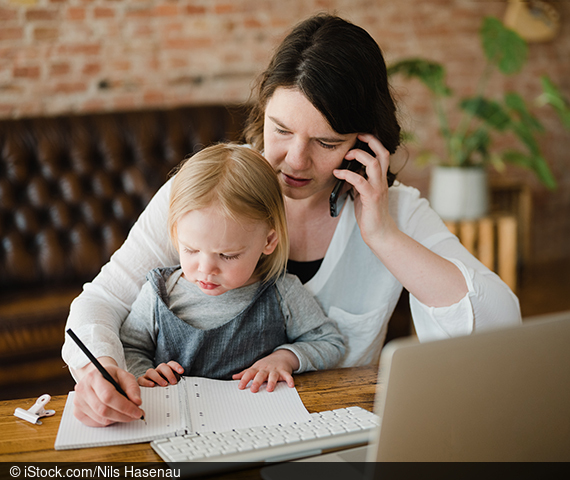Working from Home During the Pandemic Impacts the Household Division of Labour
ResearchThe lockdown measures to contain COVID-19 could reinforce traditional gender roles in families. While working from home allows mothers to increase their working hours, they also have to assume more household and child-caring responsibilities, especially if fathers are unable to work from home. In about 30 per cent of households with children, the father has a more flexible working arrangement than the mother and therefore has more time for childcare and household responsibilities. In most families, however, the bulk of these tasks are carried out by women. These are the results of a ZEW expert brief from ZEW Mannheim.
“If fathers now take on more household tasks, this could benefit mothers in the long run,” says Professor Melanie Arntz, deputy head of the ZEW Research Department “Labour Markets and Human Resources” and co-author of the ZEW expert brief. “If there is a shift towards more traditional gender roles due to COVID-19, women’s careers are likely to take damage.”
The COVID-19 pandemic has brought about massive changes in the labour market. Whereas in 2018 only 12 per cent of employees were working from home on a regular basis, this share rose to 35 per cent in April 2020, with 26 per cent of employees even working exclusively from home.
Working from home is becoming more widely accepted as a result of the crisis
“As a result of the crisis, working from home has become more common. In the long term, employers are likely to develop a more positive attitude towards remote working arrangements, which will then become more available to workers,” explains Melanie Arntz. “Both companies and employees are becoming more familiar with mobile work and realizing that it works. In the future, it will be easier to work from home since companies have had to make the necessary investments and adapt their processes due to the crisis. It is therefore likely that companies will increasingly offer arrangements that replace the need to carry out tasks and meetings at the workplace. Once working from home becomes more widely available, this will allow mothers to increase their working hours.”
However, the long-term effects will also depend on the extent to which child-caring responsibilities, which have increased due to the COVID-19-related closure of schools and childcare facilities, are shared between mothers and fathers. To investigate this question, the researchers assessed the flexibility of the parents’ work arrangements during the pandemic. In this regard, professions deemed essential during the crisis and those with tasks that can only be carried out onsite offer less flexibility. Conversely, individuals who can perform their job fully from home or who are out of paid employment, including those employed in sectors that had to close because of COVID-19, are considered as very flexible. Occupations with limited flexibility involve tasks that can be carried out only partly from home. Overall, the occupational flexibility of parents, together with the usual division of tasks at home before the crisis, suggest that women are more likely to take on these additional childcare responsibilities in the majority of families.
Mothers likely to take on more household responsibilities than fathers during the pandemic
In about 32 per cent of households, mothers had more flexible working arrangements than fathers and were therefore able to take on more child-caring and household responsibilities during the coronavirus crisis. In 24 per cent of families, the parents’ occupations were comparable in terms flexibility. However, it is likely that mothers also spend more time on childcare and housework than fathers in these households, since the domestic division of labour in families with children below the age of 13 had already been unequal before the pandemic. Even in families where both parents work, women spend three times as much time on childcare activities and twice as much time on household chores as fathers. For 85 per cent of these couples, the findings indicate that women work less hours, and for more than 60 per cent of couples, they suggest that mothers earn lower hourly wages.
However, 40 per cent of mothers and only 23 per cent of fathers had professions deemed essential during the crisis. In almost 30 per cent of households with children below the age of 13, mothers were less flexible jobwise than fathers. In these households, COVID-19 could help reverse traditional gender roles. “If fathers take on more child-caring and household tasks, this could bring about positive consequences for women,” says Melanie Arntz. “However, this is not the case for a considerable share of families. If the lockdown reinforces traditional gender roles, women will most likely benefit less from the increased use of mobile work arrangements after the coronavirus pandemic, which will entail negative consequences for their long-term career opportunities.”
